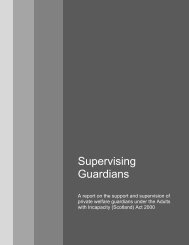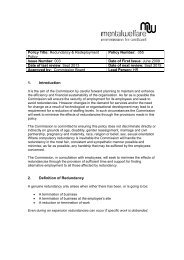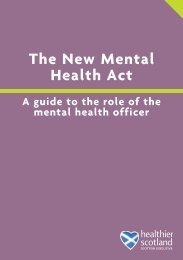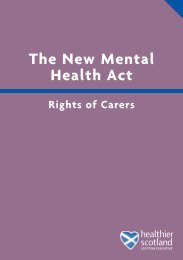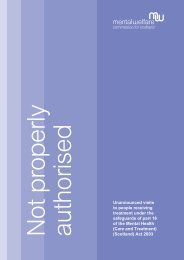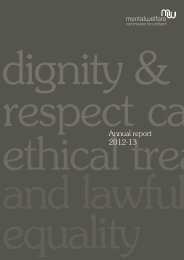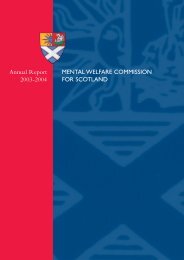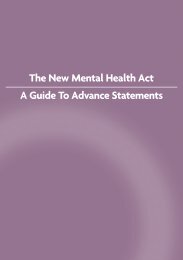decisions for dignity - Mental Welfare Commission for Scotland
decisions for dignity - Mental Welfare Commission for Scotland
decisions for dignity - Mental Welfare Commission for Scotland
You also want an ePaper? Increase the reach of your titles
YUMPU automatically turns print PDFs into web optimized ePapers that Google loves.
ADementia:<strong>decisions</strong> <strong>for</strong> <strong>dignity</strong>Our visits to peoplewith dementia ingeneral hospitalsSeptember to December 2010
1Who we are and what we doThe <strong>Mental</strong> <strong>Welfare</strong> <strong>Commission</strong> is anindependent organisation working tosafeguard the rights and welfare of everyonewith a mental illness, learning disability orother mental disorder. Our duties are setout in mental health and incapacity law.We are made up of people who haveunderstanding and experience of mentalillness and learning disability. Some of ushave worked in healthcare, social care orthe law. Some of us are carers or haveused mental health and learning disabilityservices ourselves.We believe that everyone with a mentalillness, learning disability or other mentaldisorder should:• Be treated with <strong>dignity</strong> and respect;• Have the right to treatment that is allowedby law and fully meets professionalstandards;• Have the right to live free from abuse,neglect or discrimination;• Get the care and treatment that best suitshis or her needs; and• Be enabled to lead as fulfilling a life aspossible.Our work• We find out whether individual treatment isin line with the law and practices that weknow work well.• Challenge those who provide services <strong>for</strong>people with a mental illness or learningdisability, to make sure they provide thehighest standards of care.• We provide advice, in<strong>for</strong>mation andguidance to people who use or provideservices.• We have a strong and influential voice inhow services and policies are developed.• We gather in<strong>for</strong>mation about how mentalhealth and adults with incapacity law arebeing applied. We use that in<strong>for</strong>mation topromote good use of these laws across<strong>Scotland</strong>.
2Our visitsOne of the ways in which the <strong>Commission</strong>monitors individual care and treatment isthrough our visits programme. We visitpeople in a range of settings throughout<strong>Scotland</strong>; at home, in hospital or in any othersetting where care and treatment is beingdelivered. As part of this programme wecarry out three national themed visits eachyear. The aim of national themed visits is toenable us to assess and compare care andtreatment <strong>for</strong> particular groups of peopleacross <strong>Scotland</strong>. Our aim is to help serviceslearn from good practice and to respond toany issues that are identified.This report reflects our findings from aspecial programme of visits that took placeacross <strong>Scotland</strong> between September andDecember 2010 to people with dementiain acute wards in general hospitals.Why we visitedThere are currently around 71,000 peoplewith dementia in <strong>Scotland</strong> and this numberis expected to double over the next 25 years.The risk of developing dementia increaseswith age: one person in twenty over the ageof 65 years rising to one in three peopleover the age of 80.As the population in <strong>Scotland</strong> ages, this willbe reflected in increasing use of the acutecare setting (general hospitals and accidentand emergency departments) by people withdementia.It is estimated that people with dementiaover 65 years of age are currently occupyingup to 25% of hospital beds at any time.In <strong>Scotland</strong>, up to 30% of all people admittedto medical wards are described as havingsignificant memory problems but, of thisgroup, only 30% will have a diagnosis ofdementia. Many older people admitted togeneral hospital will have symptoms butno <strong>for</strong>mal diagnosis of dementia.When admitted to hospital, people withdementia can experience increased levelsof confusion and loss of their abilities and,where possible, alternatives to admissionshould always be explored. On average,people with dementia stay longer in hospitalthan other people who are admitted <strong>for</strong> thesame medical procedure.
3A report published in 2009 by the Alzheimer’sSociety revealed that half of all carersinterviewed felt that being in hospital had anegative effect on the general and mentalhealth of the person with dementia. It alsorevealed that over a third of people withdementia who go into hospital from living intheir own homes are discharged to a carehome setting.We hear general concerns from relatives andstaff about the difficulties some people withdementia face when admitted to a generalhospital and also hear about individual caseswhere things have gone very wrong andresulted in complaints.<strong>Scotland</strong>’s National Dementia Strategy waslaunched in June 2010. The strategy statedthe Scottish Government’s commitment towork to “improve the response to dementia ingeneral hospital settings including throughalternatives to admission and better planning<strong>for</strong> discharge.”We had already stated our intention to visitpeople with dementia in general hospitalsprior to the publication of the strategy. Thetiming of our visits has come at an opportunemoment to promote current best practicein this area and identify areas where webelieve improvements need to be made.We hope that our findings will be usefulin implementing the dementia strategy.This was a new initiative <strong>for</strong> us. We havevisited general hospitals be<strong>for</strong>e but on a verylimited basis, e.g. visits to departments ofliaison psychiatry. Taking this opportunityto visit general hospitals on a larger scaleallowed us to evaluate how and when weshould visit in future. It helped us to makecontact with general hospital staff to let themknow of our functions, safeguarding role andbest practice guidance.How we carried out the visitsWe wrote to all NHS Board Chief Executivesto let them know we intended to visit and toclarify with them our powers in relation tovisiting. As we had not visited generalhospitals be<strong>for</strong>e, we thought that the staffwould need to understand why we werevisiting and under what authority. Whenvisiting, we are allowed under the <strong>Mental</strong>Health (Care and Treatment) (<strong>Scotland</strong>) Act2003 to have access to anyone who mayhave a mental disorder (this would includeanyone with dementia) and also to look atclinical notes.We selected fifty hospital wards across thecountry, mainly acute medicine <strong>for</strong> theelderly, and gave each ward about six weeksnotice of our visit. Although we have theauthority to visit on an unannounced basiswe thought that this series of visits should beannounced in advance to increase the chanceof being able to talk to key staff members.
4Because of extreme weather conditions inDecember 2010, we had to cancel some ofour planned visits. Despite this, we visited41 wards in total and met with and reviewedthe care of 194 people with dementia.Each ward was visited by one or two MWCvisitors. Following a discussion with thecharge nurse, we identified all patients in theward who had a definite or likely diagnosisof dementia. We met with as many of thesepeople as possible and also carried out areview of their care and treatment basedon the in<strong>for</strong>mation in their case file anddiscussion with the staff. Many of the peoplewith dementia that we wanted to meet withwere very physically unwell and it was notpossible to carry out a full interview with them.We completed a structured interview withthe senior nurse on each ward, gatheringin<strong>for</strong>mation about the range of servicesthe ward provided and any difficultiesencountered when caring <strong>for</strong> people withdementia. We also carried out an audit of thephysical environment on the ward and thisfocussed on how dementia-friendly andenabling the ward was.If we had concerns about an individualperson’s care, we discussed these withstaff on the day. We followed up anyrecommendations we made about anindividual’s care. Also, we gave the wardstaff both verbal and written feedback onwhat we considered was good practice andwhat we felt needed to be addressed.Our visits were warmly welcomed by generalhospital staff and managers. We are gratefulto them <strong>for</strong> their help and would also like tothank the patients and relatives who sharedtheir experiences with us.What we examinedWe focussed on the following areas when wecarried out our visits:• Admission to hospital;• The care journey;• Consent and lawful medical treatment;• Safety and restrictions;• The care environment;• Staff training and specialist mental healthsupport; and• Discharge from hospital.Summary of findings andrecommendationsPositive findingsWe found many positive aspects of the careand treatment of people with dementia ingeneral hospitals. These include:• People with dementia are being admittedappropriately when referred to hospital(although, in some cases, earlierintervention in the community may haveprevented the need <strong>for</strong> admission);• People with dementia are, in general, notbeing moved unnecessarily between wards;• There were good examples of ways toobtain and record in<strong>for</strong>mation about theperson with dementia and use this toprovide better care;
5• There was good attention to nutrition,a known risk <strong>for</strong> people with dementiain hospital;• People with dementia were generallyappreciative of the care they received;• We found that staff were dedicated,caring and had access to guidanceon best practice; and• Specialist mental health services weregenerally available <strong>for</strong> advice and support.We had several concerns and have maderecommendations <strong>for</strong> improvement. Ourconcerns are reflected in our key messagesand our recommendations to NHS Boardsand their local authority partners.Key messagesWe have developed the following keymessages so that NHS Boards, localauthorities, hospital managers, clinical andprofessional leaders and others can usethem to consider the care they provide andmake improvements where necessary.Key message 1Few admissions could have been avoided atthe point where people were referred tohospital. If more flexible and responsive careservices <strong>for</strong> people with dementia and theircarers had been available earlier, it may havebeen possible to prevent some admissions.To address this, NHS Boards should• With their local authority partners, givepriority to falls prevention work in thecommunity <strong>for</strong> people with dementiaand review services <strong>for</strong> early interventionand support.Key message 2We were pleased to find few moves betweenwards and good attention to nutrition. Generalhospital staff did not always obtain andrecord in<strong>for</strong>mation about their patients withdementia and involve relatives and friendsin their care. Screening tests <strong>for</strong> dementiawere per<strong>for</strong>med routinely but the absenceof in<strong>for</strong>mation from relatives made it difficultto differentiate delirium from dementia.To address this, NHS Boards should• Ensure that in<strong>for</strong>mation about the personwith dementia is routinely requested fromcarers and care managers on admissionand shared with people who will be havingdirect contact. This should includepersonal details, personal preferencesand usual routines.• Establish and audit tracking systems ingeneral hospitals to ensure that patientswith dementia are not moved to a differentward unless clinically necessary.• Provide guidelines and training in themanagement of delirium <strong>for</strong> all staff whoprovide care to acutely unwell people.Key message 3Legal safeguards <strong>for</strong> people who lack capacityto consent to medical treatment are not beingapplied. Proper procedures should befollowed so that they can receive necessarytreatment lawfully. Their capacity to consentshould be regularly reviewed. Clinicians donot always take specialist advice be<strong>for</strong>eprescribing psychoactive medication. Theydo not always follow best practice guidanceon administering medication covertly and onmaking <strong>decisions</strong> not to resuscitate.
6To address this, NHS Boards should• Establish and audit processes <strong>for</strong>assessment and review of capacityto consent to medical treatment.• Audit the use and review of psychoactivemedication <strong>for</strong> people in general hospitalwards.• Establish protocols <strong>for</strong> the administrationof covert medication. The MWC guidance(<strong>Mental</strong> <strong>Welfare</strong> <strong>Commission</strong> 2006) canbe used <strong>for</strong> this.• Audit the recording of “do not attemptresuscitation” <strong>decisions</strong> to ensure thatclinicians follow best practice.Key message 4General hospital staff must ensure thatmeasures to keep people with dementia safeare used lawfully and proportionately. Theyneed to be more aware of human rights andincapacity legislation.To address this, NHS Boards should• Ensure that in<strong>for</strong>mation about welfareguardians and powers of attorney iscollected on admission and highlightedon the patient record.• Update training <strong>for</strong> staff in generalhospitals in the provisions of the HumanRights Act (1998), the Adults withIncapacity (<strong>Scotland</strong>) Act 2000 and the<strong>Mental</strong> Health (Care and Treatment)(<strong>Scotland</strong>) Act 2003.• Make sure that people who have dementiaand/or are seriously ill do not sign legaldocuments if they do not have thecapacity to do so. Posters and in<strong>for</strong>mationleaflets may help.• Establish protocols <strong>for</strong> the use of“wandering technology”. This shouldinclude individual risk assessment. Itshould involve consultation with relativesbut nobody should be asked to “consent”to its use unless they have specific powersunder the 2000 Act.Key message 5Given the high number of people withdementia in general hospital wards <strong>for</strong> olderpeople, it is disappointing that many wardsdo not have an environment which isdementia friendly. Much more could bedone to make the environments enabling<strong>for</strong> people with dementia and af<strong>for</strong>d themgreater privacy and <strong>dignity</strong>.To address this, NHS Boards should• Conduct regular audits of the physicalenvironment using the dementia designchecklist and take appropriate action tomeet any deficits.• Ensure that managers of older people’swards and infection control discuss thebalance between infection risks andmaintaining an environment that helpspeople with dementia to orientatethemselves and recover.Key message 6It was encouraging to see the benefit oftraining and support <strong>for</strong> general hospitalstaff. Specialist mental health expertise wasusually regarded as valuable and should beproperly resourced.
7To address this, NHS Boards should• Make sure that all general hospitals havequick and easy access to specialist olderpeople’s mental health liaison services <strong>for</strong>assessment and advice.Key message 7People with dementia are very oftendischarged from general hospitals to carehomes on a permanent basis instead ofreturning to their own homes. Whensomeone with dementia who was living athome is discharged from hospital, facilitatinga return home should be the starting pointwhenever possible.To address this, NHS Boards should• Along with local authority partners, ensurerobust systems are in place to review<strong>decisions</strong> taken to transfer someone withdementia who previously lived at home toa care home. This may include a timescale<strong>for</strong> review, involving care managers,be<strong>for</strong>e the placement is made permanent.Comments from individuals and staffWe spoke to people with dementia to find outtheir views on being in hospital.We spoke with staff about what they founddifficult in responding to the particular needsof people with dementia.Views of people with dementiaPeople who were able and willing tocomment on their treatment and care werealmost all positive about it. Most thought theward ‘always’ had ‘a calm atmosphere’.There were a few adverse comments frompatients. Two who were ex-nurses were alittle critical and one person said that nurseshad no time to talk to patients. A very fewsaid they could not see their cards and otherpersonal things from their bed. Examples ofcomments were:“The nurses are lovely. They couldn’t beany better. I do have some fun with them.”(Lady with mild dementia)“The doctors always introduce themselvesbut the therapists – there are so many ofthem, I am never sure what they do andI don’t think they always tell me theirnames.”Views of staffWe asked staff about what made itparticularly challenging in caring <strong>for</strong> peoplewith dementia on their ward. The mainproblem they identified was the physicallayout of the wards; a lack of general privacyand too few single rooms. Our visitors thoughtthat staff did their best while under a lot ofpressure.“Very busy ward. Staff aware of needs ofpatients with dementia but clearly struggleto manage them within this environment”.MWC visitor
8“Dynamic and responsive. Meaningfulef<strong>for</strong>ts to change things while balancingchallenge of busy, acute medical ward.Winter crisis has affected what they areable to do “fire-fighting on a daily basis.”MWC visit to Crosshouse Hospital“Ward impresses as having a caring andcalm approach. Good multi-disciplinaryworking – active involvement ofoccupational therapy, physiotherapyand speech and language therapyprofessionals.” MWC visit to MonklandsHospitalWe have more to say about these issues inthe rest of this report.Admission to hospitalKey message 1Few admissions could have been avoidedat the point where people were referred tohospital. If more flexible and responsivecare services <strong>for</strong> people with dementiaand their carers had been availableearlier, it may have been possible toprevent some admissions.What we looked atWe looked at the reasons <strong>for</strong> admission tohospital and if consideration had been givento alternatives to admission. We gave somethought to how admission could have beenprevented by better services or by better“gatekeeping” when the person was referredto hospital.What we expect to findWe expect that people with dementia areadmitted only when there is no reasonablealternative to that admission.What we foundPrior to admission, most people with dementiahad been living at home either alone or withtheir family. Only a few were living in a carehome. We asked about the reason <strong>for</strong>admission to the ward <strong>for</strong> everyone we metand whose file we reviewed.About half of all people with dementia wereadmitted following a fall. The other maincause <strong>for</strong> admission was a serious infection.(See appendix <strong>for</strong> full details.) Of the peoplewith dementia admitted due to a fall, themajority were living alone at home priorto admission.We looked to see if alternatives to admissionhad been considered but we found writtenevidence of this in only a very few cases.Usually, this was because the person’sillness or injury was so severe that there wasno alternative at that time. Our visitors cameacross few cases where they considered theadmission to have been unnecessary.One exception was:“Admitted due to chair lift not working,will take one to two weeks to repair.”MWC visitorAlthough the people we met with were veryill and needed to be in hospital, earlierintervention may have prevented theadmission. This is particularly the case withthe high number of people admitted followinga fall at home. A greater focus on fallprevention within homes and care homesmay help prevent some of these admissions.Examples of our findings were:
9“No alternative at time of admission.Mr M has Parkinson’s disease which wasshowing signs of deteriorating prior to thisfall.” MWC visitor“Already concern about his vulnerability athome prior to admission, GP has referredhim to medicine <strong>for</strong> elderly about falls andold age psychiatry regarding confusionand emotional lability, not seen yet, nowurgent admission due to fall.” MWC visitor“Fall and acute confusion, suspected headinjury, requires further assessment andinvestigation, situation reported to havebeen deteriorating <strong>for</strong> some time.”MWC visitorUn<strong>for</strong>tunately, we came across some caseswhere admission had become inevitable dueto the stress and ill health of the carer of theperson with dementia. Perhaps interventionat an earlier stage may have preventedadmission.“Mrs A admitted after both she and herhusband, her carer, fell. Think that she lostconsciousness and he fell trying to helpher. He is exhausted looking after her.”MWC visitor“Admitted with general physicaldeterioration, number of physical illnesses.Refusing all medication, increase inaggressive behaviours, family strugglingto cope.” MWC visitorRecommendation:NHS Boards should, with their local authoritypartners, give priority to falls prevention workin the community <strong>for</strong> people with dementiaand review services <strong>for</strong> early interventionand support.The quality of individual careKey message 2We were pleased to find few movesbetween wards and good attention tonutrition. General hospital staff did notalways obtain and record in<strong>for</strong>mationabout their patients with dementia andinvolve relatives and friends in their care.Screening tests <strong>for</strong> dementia wereper<strong>for</strong>med routinely but the absence ofin<strong>for</strong>mation from relatives made it difficultto differentiate delirium from dementia.What we looked at• We looked <strong>for</strong> the use of screening teststo identify people who may havedementia.• We looked at the in<strong>for</strong>mation availableabout people with dementia, includingtheir likes, dislikes and at least somein<strong>for</strong>mation about their lives, family andinterests.• We wanted to find out how often they weremoved since admission.• We looked at the provision of food anddrink.• We looked at the role of carers.What we expect to findGeneral hospital staff should use simplescreening tests such as the mini-mental stateexamination (MMSE). This should besupplemented by further in<strong>for</strong>mation fromrelatives and carers.
10Not all people with dementia will haveproblems communicating their needs. Evenso, it always helps staff to have in<strong>for</strong>mationincluding individual preferences and thenames and relationships of people who areimportant. This helps staff to communicatewell with the person with dementia.Moving a person with dementia from wardto ward can be a problem. It can worsendisorientation and cause distress. Weexpect to find that people with dementia areonly moved from ward to ward where it isessential <strong>for</strong> their care and treatment.Nutrition is very important. We expect carefulattention to nutrition, especially where theperson needs assistance to eat.All of this can be helped by goodcommunication with carers. We expect tofind evidence that relatives and friends areencouraged to join in the task of caring <strong>for</strong>people with dementia in hospital.What we foundA. In<strong>for</strong>mation about the personWe asked staff about the in<strong>for</strong>mation theycollected on admission about the person withdementia. We were told that this happened inmost of the wards we visited and there wasevidence of good practice in this area.All hospitals were using screening tests,usually the MMSE, and we found that this wasper<strong>for</strong>med on admission or at an appropriatetime after admission if the person had beentoo unwell to test. We found that getting furtherin<strong>for</strong>mation about the person was generallynot carried out routinely. Also, there waspatchy practice in recording in<strong>for</strong>mationabout the person’s background, likes anddislikes. Good practice examples were:“Thoughtful care plans and they also keepin<strong>for</strong>mation re some personal preferencesabove bed and mini life story, which thenfollows the individual to next placement.”MWC visit to Biggart Hospital“Good In<strong>for</strong>mation obtained from carehomes, sent in routinely with patients.When people are admitted from ownhome, staff seek in<strong>for</strong>mation from familyabout their care needs, nutritional needsand life histories, occupational therapistand nurses do that.” Royal VictoriaHospital, EdinburghSometimes, we found that in<strong>for</strong>mation wasavailable but not well recorded.“Fascinating man. (lots of personal detailsgiven) Keen walker tends to walk aboutthe ward a lot but is at risk of getting outand getting lost. Relatives visit and takehim <strong>for</strong> walks round the grounds. Noneof this in care plan.” MWC visitor
11“Staff give relatives a “This is Me” <strong>for</strong>mto complete on admission. It asks <strong>for</strong>in<strong>for</strong>mation about the person withdementia. Un<strong>for</strong>tunately, it was then filedin the middle of a huge set of case notes;I only found it because I had set out tolook <strong>for</strong> it.” MWC visitorB. Moves since admissionWe found that most people had not beenmoved since admission (apart from a briefstay in an acute medical assessment unit).A few people had been moved out of theiroriginal ward and we found two people withdementia who had been moved three times.We asked staff if there were protocols inplace to track the movements of people withdementia from one ward to another but onlyhalf of the hospitals said they carried this out.C. Ensuring adequate food and fluidFood and fluids are essential to ensure agood recovery from illness and we often hearconcerns that people with dementia are leftwithout the help they need to eat and drink.About half of those who responded to thequestions we asked said they got their ownchoice of food, they liked the food and theygot enough to eat.All but one of the wards we visited said theyhad a system to ensure that assistance atmealtimes was provided to all who neededit and all but two operated a protectedmealtime system. This means that allnon-essential activity is stopped during mealtimes to ensure that staff can give all theirattention to helping people with their meal.We found that nutritional needs screeninghad been completed and nutritional careplans were in place <strong>for</strong> most people.Although it appeared good attention wasbeing paid to this in the wards we visited,we have heard of cases where people withdementia do not receive the help they need.Services must ensure that they continue thegood attention to nutrition that we found onthese visits.D. Carers’ rolesWe asked ward staff if there wereopportunities <strong>for</strong> carers to carry on theirrole during the admission e.g. helping withpersonal care. Most wards said there werebut how enthusiastic staff were about thisvaried from ward to ward. We found a fewexamples where this helped. Carers may beable to help in more cases and hospital staffshould encourage this.“Especially in care of person withchallenging behaviour, man with dementiawith Lewy bodies who had terrible nightterrors, his daughter would come in andsettle him. Avoided need <strong>for</strong> anysedation.” MWC visitor
12E. Additional comment – deliriumDelirium is described as an acute change inmental status characterised by hallucinations,clouding of consciousness, misinterpretationof events and sleep disturbance. Deliriumcan occur in up to half of all patients aged65 years or over who have been admittedto hospital and the number is even higher<strong>for</strong> surgical and intensive care admissions.People with dementia who are physically illhave a high risk of developing delirium andconsequently have a greater risk of dying.Where someone without dementia developsdelirium, there is a greater chance of goingon to develop dementia in the future.During our visits, we heard concerns fromstaff about the high number of patients withdelirium. We did not set out to visit peoplewith delirium. Staff thought this was an areathat required attention. They need moreguidance and support when managingpeople with delirium. This may <strong>for</strong>m partof <strong>Scotland</strong>’s dementia strategy.Recommendations: NHS Boards should:• Ensure that in<strong>for</strong>mation about the personwith dementia is routinely requested fromcarers and care managers on admissionand shared with people who will be havingdirect contact. This should include personaldetails, personal preferences and usualroutines;• Establish and audit tracking systems ingeneral hospitals to ensure that patientswith dementia are not moved to a differentward unless clinically necessary; and• Provide guidelines and training in themanagement of delirium <strong>for</strong> all staff whoprovide care to acutely unwell people.Consent and lawful medical treatmentKey message 3Legal safeguards <strong>for</strong> people who lackcapacity to consent to medical treatmentare not being applied. Proper proceduresshould be followed so that they canreceive necessary treatment lawfully.Their capacity to consent should beregularly reviewed. Clinicians do notalways take specialist advice be<strong>for</strong>eprescribing psychoactive medication.They do not always follow best practiceguidance on administering medicationcovertly and on making <strong>decisions</strong> notto resuscitate.What we looked at• We looked to see if a person’s capacity toconsent to treatment was assessed priorto treatment.• We looked <strong>for</strong> legal documentation toauthorise treatment <strong>for</strong> people who lackedcapacity to consent.• We examined the use of psychoactivemedication to find out how often it wasused, whether it was started afteradmission and who made the decisionto prescribe.• We looked to see whether medication wasbeing administered covertly.• We looked at <strong>decisions</strong> on whetherpeople should be resuscitated if therewas cardio-respiratory arrest.
13What we expect to findWe expect that people dementia will receivetreatment that is in line with the law and carethat respects their and legal and human rights.Case records should demonstrate that:• The person’s capacity to consent tomedical treatment has been assessed;• For people who lack capacity, legaldocumentation is in place to authorisemedical treatment;• Where there is a welfare attorney orguardian with the authority to consent totreatment, there is a record of consultationwith that person;• Covert medication has been administeredlawfully and in line with best practiceguidance; and• “Do not attempt resuscitation” (DNAR)<strong>decisions</strong> are made <strong>for</strong> sound reasonsand after consultation with the person(if possible) and relatives.What we foundA. Consent to medical treatment/Section 47of the Adults with Incapacity (<strong>Scotland</strong>)Act 2000.If people are not able to consent to their ownmedical treatment then hospitals should usethe law properly to safeguard them. Fromthe visits we carry out to people in hospitals,care homes and their own homes, we knowthat often this is not happening. The 2000Act gives a general authority to treat aperson who is incapable of consentingonce a certificate of incapacity (section 47certificate) has been issued. The Code ofPractice makes it clear that this certificateis required except <strong>for</strong> emergency treatment.For people who require them, we wouldexpect to find these certificates in placeand an attached treatment plan <strong>for</strong> peoplerequiring multiple or complex healthcareinterventions. This ensures that treatmentis legally authorised and shows that theprinciples of the 2000 Act have beenobserved (benefit, least restriction, takingaccount of the person’s wishes andconsulting others where possible).We came across only a few people withdementia where their capacity to consent tomedical treatment had been assessed andrecorded in the notes and even fewer whohad a completed certificate and treatmentplan. If people with dementia cannot givevalid consent and no certificate has beencompleted, their treatment does not complywith the law.
14“Focus is on medical care – very littleawareness of human rights issues suchas consent, capacity etc. Very caringoverworked staff.” MWC visitor“No section 47 certificate in place. Noassessment of capacity. No evidenceof contact with welfare POA (son) butevidence of regular communicationwith daughter.” MWC visitorAccording to the ombudsman “It isunacceptable <strong>for</strong> health practitioners not toshow proper understanding of the legislationand policies that exist to ensure that patient’shuman rights are not breached.” (SPSO200902396) Un<strong>for</strong>tunately, it appears tous that very few practitioners correctlyapplied the law on medical treatment <strong>for</strong>adults with incapacity.B. Lawful and appropriate use ofpsychoactive medicationOf the 194 files we reviewed, we cameacross 90 people who were prescribedpsychoactive drugs (antipsychotic drugs,antidepressant drugs and benzodiazepinedrugs <strong>for</strong> treating anxiety).Of these 90 people, there were 36 prescriptions<strong>for</strong> antipsychotics, 53 <strong>for</strong> antidepressantsand 22 <strong>for</strong> benzodiazepines (some peoplewere taking more than one of these drugs).Just under half of these 90 people had themedication prescribed since their admission.Where psychoactive medication wasprescribed there was evidence that apsychiatrist was consulted in only a minorityof occasions. Although there is no legalrequirement <strong>for</strong> a psychiatrist to be involved,there are some well established potentiallydangerous side effects of these medicationsin people with dementia. Good practice isillustrated in the following:“Anti-psychotic medication is prescribedand reviewed under supervision ofconsultant psychiatrist and also regularreviews of managing challengingbehaviour care plan by liaison mentalhealth nurse.” MWC visit to BiggartHospitalOnly a few people who were prescribedthese particular medications had theircapacity to consent to medical treatmentreviewed and recorded in their notes. Thefollowing example is typical of what we found:“Has been prescribed and givenHaloperidol. Could not find anything inmedical/nursing notes regardingassessment prior to this or of reason <strong>for</strong>prescription nor of capacity to consent.No legal documentation. No contactwith dementia liaison nurse so far.”MWC visitorC. Covert medicationCovert medication is the administration ofany medical treatment in disguised <strong>for</strong>m.We came across two occasions when peoplewith dementia were being given medicationcovertly. On one ward it was being donefollowing best practice guidance (<strong>Mental</strong><strong>Welfare</strong> <strong>Commission</strong> 2006) but not in theother where they had no policy in place.D. DNAR (do not attempt resuscitation):We found 56 people where clinicians hadrecorded a decision not to resuscitate in theevent of cardio-respiratory arrest. We lookedto see whether the reasons <strong>for</strong> the decisionhad been documented and what account
15was taken of the views of the patient orrelatives. We wanted to see if best practicewas being observed as per the jointstatement from the British MedicalAssociation, Resuscitation Council (UK)and Royal College of Nursing (2007).In most cases, we found good use ofstandard documentation. An example ofgood practice was:“Notes indicate how DNAR arrivedat, extensive discussion with family.Is on “Liverpool Care Pathway” <strong>for</strong>terminal care.”In a few cases, we were not satisfied thatthere had been sufficient consultation. Also,as the person’s condition may change, thedecision should be kept under review.“DNAR was written in a previous ward andwas signed by medical staff but not inconsultation with family. Needs to beupdated now she’s better.”We were particularly concerned to find acase file where someone had written “not<strong>for</strong> 2222” (code <strong>for</strong> calling the arrest team).There was no signature or date and the <strong>for</strong>mthat should have specified the reasons <strong>for</strong>the decision and the consultation undertakenwas left blank. We immediately raised thiswith clinical staff.Recommendations: NHS Boards should:• Establish and audit processes <strong>for</strong>assessment and review of capacityto consent to medical treatment;• Audit the use and review of psychoactivemedication <strong>for</strong> people in general hospitalwards;• Establish protocols <strong>for</strong> the administrationof covert medication. The MWC guidancecan be used <strong>for</strong> this; and• Audit the recording of “do not attemptresuscitation” <strong>decisions</strong> to ensure thatclinicians follow best practice.Safety and restrictionsKey message 4General hospital staff must ensure thatmeasures to keep people with dementiasafe are used lawfully and proportionately.They need to be more aware of humanrights and incapacity legislation.What we looked at• We looked <strong>for</strong> people who were beingdeprived of liberty, privacy or <strong>dignity</strong>.• We looked at the use of the powers ofwelfare attorneys and welfare guardians.• We identified other legal or ethical issuesthat were of concern to staff.What we expect to findWe expect that people with dementia willreceive care and treatment which respectstheir legal and human rights. Staff shouldhave knowledge of relevant legislation. Caserecords should demonstrate that:• “Restraint” in its broadest sense (includingtechnology to prevent the person leavingthe ward) is necessary and based on anindividual assessment of risk.• Where the person is being deprived of theright to leave when they wish to do so, thisis done in line with mental health andincapacity legislation.
16What we foundA. Restraint and deprivation of liberty.Use of restraint: Forty-four people withdementia had bed rails in place to preventthem accidentally falling out of bed. In themajority of cases the necessity <strong>for</strong> this wasdocumented in the care plan. However, somewards appeared to use them indiscriminatelywith little attention paid to whether they wereneeded or not.“Wandering technology”: Five visitorsmade reference to the use of “WanderGuard”or “tagging “on the wards visited. This is asystem where a patient wears an electronicwrist tag that sets off an alarm if they leavethe ward. These systems are usedincreasingly and the aim is to alert staff whena particularly vulnerable patient is leaving.The system may have benefits <strong>for</strong> individualpatients but we found it to be used on somewards in a blanket fashion <strong>for</strong> anyone withdementia who was able to walk around.Relatives were usually asked <strong>for</strong> their“permission” by staff to use this system.Unless there is a specific legal power <strong>for</strong> aproxy to give consent to this, there is nolawful basis <strong>for</strong> this permission, although theprinciple of consulting relatives should beobserved. The Scottish Public ServicesOmbudsman raised concerns about the lackof a specific policy in a hospital <strong>for</strong> aWanderGuard bracelet. (SPSO 200801921)“De facto” detention: People with dementiamay wish to leave hospital but are preventedfrom doing so. While there may be goodreasons <strong>for</strong> this, it must be done lawfully. Ifnot, we call this “de facto” detention. In onehospital the charge nurse reported that atany time up to one third of all the patients onthe ward had dementia but in all the 7 yearsshe had worked there, she had never knownthe <strong>Mental</strong> Health Act to be used. We areconfident that she has been caring <strong>for</strong> peoplewho were being “de facto” detained.As an example, we met Mrs S, a person withdementia. She had recovered from a seriousillness but was still in hospital because hersafety at home could not be guaranteed. Shetold us, “Even the staff in here wonder whyI’m in here, wandering about. I walk aroundlike a lost cause.” “I just came in because Iwas tired, worn out, couldn’t cope. I’m not soill I need to be here <strong>for</strong>ever.” We asked staffabout her and were told that when otherpeople go home, Mrs S can mention wantingto leave a few times in a day. We wereconcerned that no thought appeared to havebeen given to <strong>for</strong>mal measures to keep her inhospital. We asked the staff to review thisand a mental health assessment was carriedout. Fortunately, with sensitive management,it was possible to reassure Mrs S and sheaccepted the need to be in hospital whileoptions <strong>for</strong> her future care were explored.B. Involvement of welfare proxiesThe 2000 Act allows families, carers andsometimes the local authority to makewelfare <strong>decisions</strong> <strong>for</strong> a person who lackscapacity. When a person has capacity to doso, they can grant a power of attorney (POA).This gives a person they trust, often a familymember or a solicitor, the power to makecertain <strong>decisions</strong> or take certain actions ontheir behalf if they lose their ability to make<strong>decisions</strong> themselves.
17The 2000 Act also allows <strong>for</strong> the appointmentof welfare (and/or financial) guardians <strong>for</strong>people with impaired capacity. It sets outhow <strong>decisions</strong> can be made <strong>for</strong> them.Such appointments are authorised bythe Sheriff Court.We came across only a few people withdementia who had a welfare proxy (welfareguardian or welfare POA). In about half thecases where staff were aware of theexistence of a welfare proxy, they did notknow if the powers included making healthcare <strong>decisions</strong>. Most hospitals had no placein the patient record to highlight if there wasa <strong>Welfare</strong> POA or Guardian. Proxies withrelevant powers concerning consenting tomedical treatment must be consulted underPart 5 of the Act, where it is reasonable andpracticable to do so.Some staff found that relatives did not makethem aware of their proxy powers until therewas a difference of opinion. Also, it isimportant that welfare and financial proxiesuse their powers responsibly. Staff must takeaction if this does not appear to happen. Thefollowing case is an example where staff hadto take action:“Miss B was wearing a hospital gown andhas not had her own clothes with her sinceher admission several months ago. Theperson holding Power Of Attorney hasbeen asked repeatedly to bring them in byward staff – she promises to do so, butthen doesn’t follow through. Social workernow involved.” MWC visitorC. Other legal issuesIn one ward, staff highlighted the problem ofsolicitors or family members coming into theward and asking people with dementia tosign legal documents, such as granting PowerOf Attorney without approaching staff first toask about the appropriateness of this. Staffoften only found out about these visits afterthey had happened and had serious doubtsabout the capacity of some of these peopleto understand what it was they were signing.Recommendations: NHS Boards should:• Establish protocols <strong>for</strong> the use of“wandering technology.” This shouldinclude individual risk assessment. Itshould involve consultation with relatives,but nobody should be asked to “consent”to its use unless they have specific powersunder the 2000 Act;• Ensure that in<strong>for</strong>mation about welfareguardians and powers of attorney iscollected on admission and highlightedon the patient record;• Update training <strong>for</strong> staff in generalhospitals in the provisions of the HumanRights Act (1998), the Adults withIncapacity (<strong>Scotland</strong>) Act 2000 and the<strong>Mental</strong> Health (Care and Treatment)(<strong>Scotland</strong>) Act 2003; and• Make sure that people who have dementiaand/or are seriously ill do not sign legaldocuments if they do not have thecapacity to do so. Posters and in<strong>for</strong>mationleaflets may help.
18The care environmentKey message 5Given the high number of people withdementia in general hospital wards <strong>for</strong>older people, it is disappointing that manywards do not have an environment whichis dementia friendly. Much more could bedone to make the environments enabling<strong>for</strong> people with dementia and af<strong>for</strong>d themgreater privacy and <strong>dignity</strong>.What we looked atIt is well recognised that a dementia friendlyphysical environment can be enabling <strong>for</strong>someone with dementia but a poorenvironment can add to levels of confusionand stress. We looked closely at the physicalenvironment in the ward.What we expect to find• We expect to find flexible accommodation,including some single rooms that canensure extra privacy when required.• We expect that attention has been givento making the environment as dementiafriendly as possible.• People with dementia should be able touse equipment to call staff <strong>for</strong> attention.What we foundThe majority of wards had signs pointing tokey areas such as bathrooms. Signs werelarge enough, bold and distinctive in fewerthan half of these wards. People withdementia were able to see signs <strong>for</strong> the toiletfrom their bed or the main door into the bedarea in just under half of the wards we visited.In three wards, we found items such as thesoap dispenser, bin etc. that were clearlylabelled with pictures as well as words.Most of the newer buildings providedincreased privacy by having a highernumber of single rooms, but at the expenseof providing communal areas. Three wardswe visited had no single room provision atall and in about half of the wards less thana fifth of beds were in single rooms.We found individual cases of people whoseaccommodation did not help their recovery.We did not think their accommodation wasmeeting their needs or their right to privacyand <strong>dignity</strong>. We were told that some changesto the environment that would benefit peoplewere rejected because of infection risks.This included personal items such as softtoys, cards and pictures. It is very importantto reduce the risk of introducing infection.It is also important that people with dementiahave care that offers them com<strong>for</strong>t, <strong>dignity</strong>and orientation to help their recovery.Hospital managers need to balancethese issues carefully.
19Some examples of good practice were:“Environmental audit was completed andredesign has taken place in line withrecommendations from the audit.Evidence that patients were given buzzersand encouraged to use these. These areresponded to.” MWC visit to AberdeenRoyal Infirmary“Have new toilet signs that have beenspecially made in bright colours to standout. Con<strong>for</strong>m to best design <strong>for</strong> dementia.”MWC visit to Monklands HospitalUn<strong>for</strong>tunately, we found many examples ofless good accommodation:“Corridors are very narrow. I found thatwider corridors had equipment, trolleys etc.parked at the side where the handrail was.Frail patients would be unable to negotiatethe corridors. Signage generally poor.One tiny pictorial sign on one toilet only.Cannot identify toilets in bed areas.Sign (words only) is on the outside.Not visible if door is open. Some signsin corridors point in direction of nearesttoilet.” MWC visitor“Only four single rooms. Often taken upwith patients with MRSA or close to death.Very occasionally relatives of non-dementiapatients will complain about having toshare with someone with dementia.”Ward nurse“Patient was in single room with dooropen. Noisy corridor near nurse’s station.No TV or radio or means to summon help.Not even well placed to look out of thewindow.” MWC visitor“Charge nurse said no problems with theward layout but when questioned furthersaid only two side rooms, too many exitsand layout is poor and there is a lack ofprivacy”. MWC visitorRecommendations: NHS Boards should:• Conduct regular audits of the physicalenvironment using the dementia designchecklist and take appropriate action tomeet any deficits; and• Ensure that managers of older people’swards and infection control discuss thebalance between infection risks andmaintaining an environment that helpspeople with dementia to orientatethemselves and recover.Staff education and specialist mentalhealth supportKey message 6It was encouraging to see the benefit oftraining and support <strong>for</strong> general hospitalstaff. Specialist mental health expertisewas usually regarded as valuable andshould be properly resourced.What we looked atEducation and training <strong>for</strong>m an important partof <strong>Scotland</strong>’s dementia strategy. We lookedat how much training and in<strong>for</strong>mation wasavailable to general hospital staff. We alsolooked at the “liaison service” provided bymental health practitioners.
20What we expect to find• Staff should have knowledge of goodpractice guidance <strong>for</strong> the care of peoplewith dementia and the legal framework<strong>for</strong> their care.• Staff should have ready access to mentalhealth practitioners <strong>for</strong> advice and supportin the management of people withdementia.What we foundA. Staff knowledge of best practice indementia care and training in dementia.We found that most wards had availablea copy of the guideline from the ScottishIntercollegiate Guidance Network SIGN 86,management of patients with dementia.A minority of wards had available a copy ofCaring <strong>for</strong> People with Dementia in AcuteCare Settings, A resource pack <strong>for</strong> staff.The majority of wards did though havecopies of the Alzheimer <strong>Scotland</strong> publication,Coping with someone with dementia.The majority of wards reported that they hadreceived training in the <strong>Mental</strong> Health Actand the 2000 Act, but in most cases thiswas many years ago and required updating.The majority of wards said their staff hadaccess to and attended dementia awarenesstraining. We found some good examples.In Gartnavel General Hospital, nurses andhealth care assistants are attending a bestpractice in dementia awareness day thatincludes input from carers of people withdementia and a session on pain assessment.B. Access to dementia specialistsOne of the 41 wards we visited was unableto supply this in<strong>for</strong>mation. Of the <strong>for</strong>ty wards<strong>for</strong> which we have in<strong>for</strong>mation:• 18 wards reported access to a specialistdementia liaison nurse and a dedicatedliaison old age psychiatrist;• 14 wards reported access to a specialistdementia liaison nurse or a dedicatedliaison old age psychiatrist; and• 8 wards reported no access to a specialistnurse or old age liaison psychiatrist (theycould still refer individual people, but notto a dedicated team).We found that specialist advice was often,but not always, regarded as helpful. Whereit was seen as unhelpful, it appeared todamage the relationships between servicesand denied other people access to specialistadvice. It is important to discuss and resolvedisagreements and gain a sharedunderstanding of some of the challengesfaced by staff in general hospitals. Here aresome examples of what we were told:“Really helpful to have advice and supportfrom specialists, their approach is calmand they share their knowledge andexperience and work closely with wardstaff. Gone are the days of “flattening”people with drugs, in fact the reverse isnow true.” Nurse in Hairmyres Hospital“Dementia nurse gives excellent adviceon management of agitation and distressduring dressing changes. This mademedication unnecessary.” Nurse in RoyalAlexandra Hospital, Paisley
21“We were having real difficulty managingthe behaviour of one elderly lady withdementia and some paranoia and wethought her <strong>dignity</strong> was at risk. Wecontacted the dementia nurse specialist<strong>for</strong> advice but she told us there wasnothing she could do as the patient hadcapacity and had to be allowed to dowhatever she liked .We didn’t find thisaccurate or helpful so doubt we will askagain <strong>for</strong> advice!”We looked at wards where there wasspecialist input to see if that had an impacton any other areas of care, including whetherit was more likely that an assessment of anindividual’s capacity was recorded. Therewas some improvement in these numbersbut they still remained very low with only afew people receiving an assessment.We found that most people who wereprescribed psychoactive medication had notbeen seen by a mental health specialist.Some individual cases we looked at clearlydemonstrated the benefit <strong>for</strong> the person withdementia when ward staff were able toquickly access dementia specialists <strong>for</strong>advice, support and assessment.Recommendation:NHS Boards should make sure that allgeneral hospitals have quick and easyaccess to specialist older people’s mentalhealth liaison services <strong>for</strong> assessment andadvice.Discharge from hospitalKey message 7People with dementia are very oftendischarged from general hospitals tocare homes on a permanent basis insteadof returning to their own homes. Whensomeone with dementia who was livingat home is discharged from hospital,facilitating a return home should bethe starting point whenever possible.What we looked atWe wanted to find out what plans were beingmade <strong>for</strong> discharge. In particular, we wantedto see whether the aim was to establish theperson back in his/her own home or whethera care home or continuing hospital care wasthe plan.What we expect to findDischarge planning should start early inthe person’s stay in hospital. For peopleadmitted from their own homes, the aimshould be to help them to function at theirbest. The presumption should be that theywill return to their own homes and thatalternatives should only be sought if this isnot practicable. We expect that the views ofthe person with dementia and their carersare respected.
22What we foundThe majority of people we met with had beenin hospital between 2 weeks and threemonths, although we did come across twopeople who had been in hospital <strong>for</strong> over ayear. We examined the discharge plans <strong>for</strong>people that we met with and found of thoseadmitted more than two weeks previously,the majority had a discharge plan. Of thosewho had been in hospital <strong>for</strong> less than twoweeks, about half had a discharge plan. Wewould not expect a discharge plan <strong>for</strong> peoplewho are still seriously ill.We found 44 people where a decision hadbeen made <strong>for</strong> them to be discharged to acare home but only 10 of those people hadlived in a care home prior to their hospitaladmission. The majority had been living athome alone or with relatives. This seems toreflect the concerns raised by people withdementia, carers and care professionalsabout high numbers of people not returningto their own homes and this is highlighted in<strong>Scotland</strong>’s National Dementia Strategy.Very important <strong>decisions</strong> about the future ofpeople with dementia are often made in thegeneral hospital setting immediately followinga time of crisis. Decisions to move a personwith dementia to a care home rather thanreturn to their own home are often takenwith the intention of minimising risks <strong>for</strong>the person with dementia and dischargingthem quickly from the acute care setting.Particular concerns about people withdementia moving directly to a care homefrom hospital include:• The person with dementia being incapableof consenting to this and notunderstanding the implications;• The person with dementia agreeing to goso as not to be “a burden”;• Pressure put upon the person withdementia to agree to the move by familyand care professionals; and• The person not being given enough timeand opportunity to recover from theirtrauma or illness be<strong>for</strong>e undertaking sucha huge life change.“It has now been decided that care homeplacement will be sought <strong>for</strong> Mr B due tounsuitability of his flat and increased careneeds. Mr B says he is not “bad enoughyet “to need a care home. Clear with mehe wants to go home soon, care plan anddischarge plan does not mention hisresistance to move.” MWC visitor“Miss A waiting <strong>for</strong> a care home placement<strong>for</strong> three weeks now, being “boarded” inward x, niece keen Miss A goes to carehome. Miss A seems reluctantly compliantand says she will do what they think isbest but would prefer to go home.”MWC visitor“There’s nothing in the notes about tryingher at home. The nursing home bed wasfound as an emergency but she may havehad an infection that was causing theparanoia. Concerned that no attempt hasbeen made to reintroduce her back to herhome environment.” MWC visitorThere will of course be some occasionswhen returning to a person’s own homemay not be possible.
23“Referred to social worker as it appearsneeds care home. Awaiting allocationwhich generally takes a few weeks.Then needs assessed <strong>for</strong> 24 hour care.Only agreed today but need <strong>for</strong> referraldiscussed at 2 previous ward rounds.”MWC visitorWhen people were to be returning to theirown home, we found evidence of goodliaison between the hospital and communitycare services. We found delays in gettingpeople back home in seven cases and thesewere mostly due to delays in putting a careand support package in place.“Mrs G should be discharged in nextcouple of days. Hospital has been incontact with son and with care providerto resume care package on her return.Awaiting in<strong>for</strong>mation of date they willreinstate service. In sheltered housing.”MWC visitor“Some safety concerns. Possible firerisk – smokes at home. Son consideringalternative. He is recorded as havingPower Of Attorney but not clear if welfareor financial and what the powers are.Good record of involvement of family.Clear that their concerns about risks athome are documented and that thereis a plan to address them.” MWC visitor“Lives with husband who is struggling withwife’s decline – increase incontinence/falls/confusion, but wants her home andso does she. OT and physiotherapistvisited home – some changes and aidsplus referral to SW <strong>for</strong> respite andincrease in home care. (Panel agreedfunding <strong>for</strong> increase.)” MWC visitorAlthough ef<strong>for</strong>ts are made to get peoplehome, sometimes we felt that more attentionneeded to be paid to the risks.“Complex problems of Parkinson’sdisease and dementia. Going home.Evidence in notes of geriatric medicineinput via clinic appointments. Cannotdetermine if mental health services everinvolved. Staff did not know. No referralto dementia nurse. Referral needs to bemade.” MWC visitor“Evidence of contact with son to adviseMum going home tomorrow. Causingconcern and difficulty as home care notin place and house not ready. Dischargere-arranged at son’s insistence to allowhome to be ready and assessment <strong>for</strong>care package to be completed.”MWC visitorRecommendation:NHS Boards should, along with localauthority partners, ensure robust systemsare in place to review <strong>decisions</strong> taken totransfer someone with dementia whopreviously lived at home to a care home.This may include a timescale <strong>for</strong> review,involving care managers, be<strong>for</strong>e theplacement is made permanent.
24Conclusions and further actionWe hope that the key messages in this reporthelp in the implementation of <strong>Scotland</strong>’sdementia strategy. Staff in general hospitalsshould bear these messages in mind whencaring <strong>for</strong> people with dementia. There issome action already being taken.For example, in NHS Lothian, we learnedthat the Alzheimer <strong>Scotland</strong> nurse consultanthas developed 10 good practice statementsthat five of the acute hospital wards havesigned up to. These have been very wellreceived. They are currently being evaluatedand will be rolling out to other wards in theservice. The statements address:• Staff knowledge and awareness ofdementia;• Making the diagnosis known;• Sharing and gathering in<strong>for</strong>mation;• Screening and assessment;• Dementia friendly environment;• Staff approach and communication;• Behaviour that challenges;• Managing risk;• Legal considerations; and• Discharge arrangements.This should improve care and would bein line with many of the messages andrecommendation in our report, Other NHSBoards should adopt a similar approach.ReferencesCaring <strong>for</strong> People with Dementia in AcuteCare Settings, A resource pack <strong>for</strong> staff,Dementia Services Development Centre andScottish Government 2009Counting the Cost, Caring <strong>for</strong> people withdementia on hospital wards, Alzheimer’sSociety 2009 http://alzheimers.org.uk/site/scripts/download_info.php?fileID=787Covert medication, legal and practiceguidance; <strong>Mental</strong> <strong>Welfare</strong> <strong>Commission</strong>: 2006http://www.mwcscot.org.uk/web/FILES/Publications/Covert_Medication.pdfDecisions relating to cardiopulmonaryresuscitation; British Medical Association,Resuscitation Council (UK) and RoyalCollege of Nursing (2007).http://www.resus.org.uk/pages/dnar.pdf<strong>Scotland</strong>’s National Dementia Strategy:Scottish Government 2010http://www.scotland.gov.uk/Publications/2010/09/10151751/0Scottish Public Services Ombudsman case200801921 July 2009http://www.spso.org.uk/webfm_send/2224Scottish Public Services Ombudsman case200902396 September 2010http://www.spso.org.uk/media-centre/newsreleases/ombudsmans-commentaryseptember-2010
25Appendix: definitions, lists and tablesDefinition of terms used in this report• Most = more than 80%• The majority = 56-80%• About half = 45-55%• A minority = 20-44%• A few = less than 20%• Very few = less than 10%Reason <strong>for</strong> admission to hospital:Reason <strong>for</strong> admission No. percentagefall 92 47%infection 37 19%confusion 17 9%general deterioration 8 4%Stroke 7 4%other 31 16%No in<strong>for</strong>mation 2 1%Total 194 100%People admitted because of a fall:home circumstances be<strong>for</strong>e admissionHome circumstances No. percentageAlone 62 67%With carer or relative 24 26%Care home 4 4%Not known 2 2%Total 92 100%
26Hospitals/wards visitedHealth Board Hospital WardNo ofBeds Description (by the NHS Board)Highland Raigmore 5A 25 Care of the elderlyHighland Western Isles 2 General medicalHighlandMid ArgyllHospitalGlassaryWard10 Care of the elderly and rehabGrampianGrampianGrampianWoodendHospitalWoodendHospitalAberdeen RoyalInfirmaryOak/ 20 Slow stream rehabWestviewWard 6 24 Slow stream rehab+-Ward 3/4 26 General medicalGrampian Dr Grays Ward 7 27 General medicalTaysidePerth Royal Tay Ward 30 Medicine <strong>for</strong> the elderlyInfirmaryTayside Ninewells Ward 31 18 Medicine <strong>for</strong> the elderlyForth ValleyForth Valley WA31 32 Care of the elderly rehabilitationRoyal HospitalGreater Glasgow & Clyde Southern General Ward 55 30 Assessment and rehab.Greater Glasgow & Clyde Victoria Infirmary Ward North 2 25 Assessment and rehab.Greater Glasgow & Clyde Stobhill W46 20 Assessment and rehab.Greater Glasgow & Clyde Royal Infirmary Ward 11 11 Assessment and rehab.Greater Glasgow & Clyde Stobhill 11B 24 Assessment and rehab.Greater Glasgow & Clyde Gartnavel 3C 24 Assessment and rehab.GeneralGreater Glasgow & Clyde Gartnavel 3A 24 Assessment and rehab.GeneralGreater Glasgow & Clyde RAH W3 30 Assessment and rehab.Greater Glasgow & Clyde Inverclyde Larkfield 30 Assessment and rehab.Unit 2Greater Glasgow & Clyde Inverclyde Larkfield 30 Assessment and rehab.Unit 3Dumfries & Galloway Royal Infirmary W12 27 Medicine <strong>for</strong> the elderly - acuteDumfries & Galloway Royal Infirmary W18 25 Medicine <strong>for</strong> the elderly - acuteDumfries & Galloway Moffat Hospital 21 Medicine <strong>for</strong> the elderly - mixedDumfries & Galloway Annan Hospital 24 Medicine <strong>for</strong> the elderly - mixedAyrshire & Arran Biggart Hospital Drummond 30 Continuing careAyrshire & Arran Biggart Hospital Urquhart 30 Geriatric rehabilitation
27Health Board Hospital WardNo ofBeds Description (by the NHS Board)Ayrshire & Arran Ayrshire Central Pavilion 3 25 RehabilitationAyrshire & ArranCrosshouse 5D 30 Geriatric assessmentHospitalAyrshire & ArranCrosshouse 5E 30 Geriatric assessmentHospitalLanarkshireHairmyres W16 30 RehabHospitalLanarkshireHairmyres W3 20 Assessment/rehabHospitalLanarkshireMonklands W20 24 Assessment/rehabHospitalLanarkshireMonklands W22 24 Assessment/rehabHospitalLanarkshireWishaw General W9 25 Assessment/rehabHospitalLanarkshireWishaw General W12 25 Rehab/GORUHospitalLothian Liberton Hospital W4 20/22 Assessment/rehabLothian Liberton Hospital W7 20 Assessment/rehabLothianRoyal Victoria W4 24 Assessment/rehabHospitalLothian Roodlands 1b 30 Assessment/rehabLothian Roodlands 3 14 Medical
Thistle House91 Haymarket TerraceEdinburghEH12 5HETel: 0131 313 8777Fax: 0131 313 8778Service user and carerfreephone: 0800 389 6809enquiries@mwcscot.org.ukwww.mwcscot.org.ukMarch 2011




